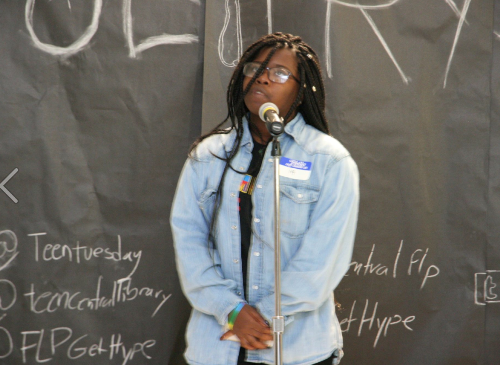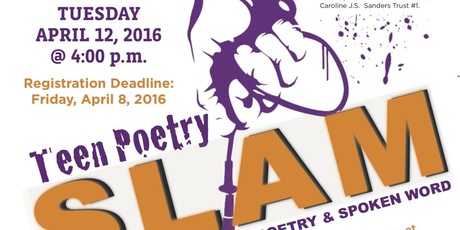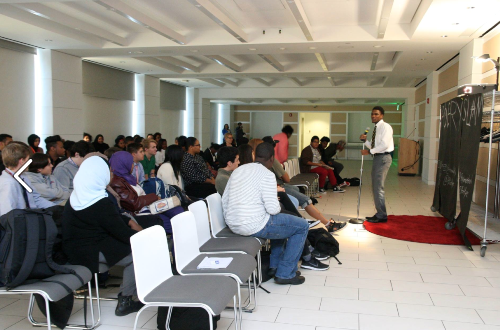2018 School Spending Survey Report
How To Plan a Teen Poetry Slam at the Library
Librarian Abbe Klebanoff shares tips and suggestions for organizing a teen poetry slam event during National Poetry Month and beyond.

Participant in Free Library of Philadelphia (FLP) Teen Poetry Slam event. Photos by Pamela Yau.
I try not to panic more than four times a day, but I made an exception when I was tasked with coordinating the Free Library of Philadelphia’s (FLP) annual Teen Poetry Slam being held on April 12. After all, last year more than 200 people packed into our Skyline Room to watch 20 young poets perform. At stake is big prize money. The first place winners take home $200, second place $150, and third place $100. Our special guest judge was last year’s poet laureate of Philadelphia, Frank Sherlock, who also performed. Each year, a new group of talented young Philadelphia high school poets move the audience with spoken word pieces about issues that touch their lives in profound ways. Donald Root, former chief of central public services at FLP, remarked, “Often [the poems] are about race and what an integral thing that was in their lives— like every breathing moment.” No pressure, right? Luckily, I was left with a detailed playbook. And hey, if I can do it, so can you. Since the Slam is always in April, we begin preparing for our event in February. By the first week of February, our goals are to recruit the new Philadelphia Poet Laureate, MC, and DJ; create postcards with rules, registration information, dates, and times; send them to all Philadelphia middle and high schools, addressed to the librarian, principal, and counselor; and deliver flyers to all FLP library branches. At the end of February, we post information about the event on our social media channels and send promo postcards to all of our school and community contacts, including the Police Athletic League and Recreation Centers. We also select slammer gift certificates and identify judges and potential youth or community organizations to partner with. In March, we follow up communication with emails to all English department heads, guidance counselors, principals, and librarians in the community. We also begin our social media blitz in full force, tweeting to all our partners, youth writers organizations, and schools. Our special guest judge this year is Yolanda Wisher, the newly appointed Philadelphia poet laureate. In addition, we’ve snagged the MC from the Philadelphia Youth Poetry Movement, a local organization catering to teen poets. The contest is open to all Philadelphia high school students. Along with a photo release form, and registration form, teems are also informed ahead of time of the following rules:
At the end of February, we post information about the event on our social media channels and send promo postcards to all of our school and community contacts, including the Police Athletic League and Recreation Centers. We also select slammer gift certificates and identify judges and potential youth or community organizations to partner with. In March, we follow up communication with emails to all English department heads, guidance counselors, principals, and librarians in the community. We also begin our social media blitz in full force, tweeting to all our partners, youth writers organizations, and schools. Our special guest judge this year is Yolanda Wisher, the newly appointed Philadelphia poet laureate. In addition, we’ve snagged the MC from the Philadelphia Youth Poetry Movement, a local organization catering to teen poets. The contest is open to all Philadelphia high school students. Along with a photo release form, and registration form, teems are also informed ahead of time of the following rules: - Performers must be prepared to present twice
- Poems must be performed not read
- Performances limited to 1 1/2 minutes
- No props or audio
- Keep it clean!!!

Group of teens celebrating the power of the spoken word at the FLP.
Just as a poem is created and transforms, our slam has also evolved. About 15 years ago, it had its origins as a written poetry contest. English teachers assigned poems and sent them the library to be judged. It was a daunting and laborious task sifting through an abundance of poems, many from students with little interest in poetry. Then, a couple of librarians happened upon a poetry slam/spoken word competition and the next year we launched our own slam. In recent years, as word has spread, attendance has been booming. All told, 21–25 youth compete. Though we ask teens to register ahead, it’s first come first serve, the day of the event. The first 25 teens who sign up on the day of the event will be judged. Poets are graded on a scale of one to five in the categories of skill, stage presence/presentation, and creativity. There are two rounds. The top three-quarters move to the second round. The DJ plays top 40 hits before the event, during intermission when the judges deliberate, and at the end. After a brief introduction from the teen librarian about upcoming programs and housekeeping rules, the event is turned over to the MC who introduces judges, who will also perform a poem, along with the Philadelphia youth poet laureate. We booked a second room at the library for the judges to render decisions during the two intermissions, while our DJ plays for the audience. It is also at this time that any overflow of teens who were not able to perform for the judges get a chance to shine. After round two, finalists are called one by one to perform. After the last poet performs, the judges meet again, and the winners are announced. This year, the major hurdles I’ve experienced occurred when one of our three judges dropped out a week before the contest. I recently completed an online YALSA programming class where the message I took away was “partner with local organizations.” As a result, I’ve reached out to city non-profit youth writer organizations anxiously awaiting an answer. We are lucky to have a robust budget of $750.- $450 for prize money for the teen poets
- $300 for the MC and DJ
- $25 for snacks and beverages for judges.
Abbe Klebanoff is a librarian at the Free Library of Philadelphia.
RELATED
RECOMMENDED
CAREERS
The job outlook in 2030: Librarians will be in demand
CAREERS
The job outlook in 2030: Librarians will be in demand
ALREADY A SUBSCRIBER? LOG IN
We are currently offering this content for free. Sign up now to activate your personal profile, where you can save articles for future viewing






Add Comment :-
Be the first reader to comment.
Comment Policy:
Comment should not be empty !!!